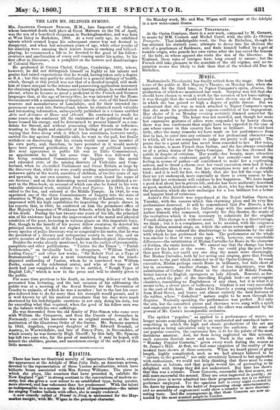3E114.
Mademoiselle Piccolomini has finally retired from the stage. She took leave of the public at Her Majesty's Theatre, on Monday last, when she appeared, for the third time, in Signor Campana'a opera, .Almina, the production of which we mentioned last week. Surprise was felt that she should have chosen so weak a work for the occasion of her leave-taking : it was thought that she would naturally have chosen one of those parts in which she has gained so high a degree of public favour. But we understand that she was so much attached to Signor Campana's opera that she made its production an express condition of her engagement. Her choice of it on Monday evening certainly dimmed somewhat the éclat of her parting. The house was not crowded, and, though her mute but expressive gestures of adieu were responded to by hearty cheers, there was less excitement than might have been expected in the case of one whose career in this country has been so brilliant. It would boot little, after the many remarks we have made on her performances from first to last, to enter into any estimate of her professional character—as to which, all who are competent to judge are pretty well agreed. The praise duo to a great artist has never been conceded to her. Her voice, in its timbre, is more French than Italian, and she has always reminded us of a prima donna of the Opera Comique. But she has charmed the public in despite of criticism. Her youth—her beauty, more attractive than classical—the exuberant gaiety of her comedy—and her •etrong feeling in scenes of pathos—all contributed to make her a captivating actress, and to throw a charm over her vocal execution even had it been more defective than it was. But her attractions were not of a durable Lind ; and it is well for her, we think, that she has left the stage while they are yet undecayed, more especially as there is every reason to be- lieve that her retirement will conduce to her happiness. We have heard a good deal about her in private life, and she has been uniformly described as good, modest, kind-hearted—a lady, in short, who has done honour to the profession which she now exchanges for a less brilliant but a better and happier kind of existence. Auber's Fre Diavolo was reproduced at the Royal Italian Opera on Tuesday, with the success which this charming piece and its very fine performance deserved. It will be remembered that Fra Diavolo, a few years ago, was adapted to the Italian stage with the assistance of the author himself, who composed, expressly for this theatre, the music of the recitatives which it was necessary to substitute for the original French dialogue spoken without music. This change is a disadvantage, we think ; but it is a compliance, not to be avoided, with the exigences of the Italian musical stage, on which the actors never speak : and cer- tainly Auber has reduced the disadvantage to its minimum by the skill with which he has performed the task. The performance on the whole was similar to that of two years ago ; with, however, one remarkable difference—the substitution of Miolan Carvalho for Bosio in the character of Zerlina, the rustic heroine. We cannot say that the change has been either for the better or the worse. No one could play the part better than poor Bosio, nor could any one sing the music more charmingly. But Miolan Carvalho, both by her acting and singing, gave that French tournure to the part which reminded us of the Opera Comique. In vocal execution, Miolan perhaps excels Bosio in brilliancy, but falls short of her in sweetness. Another change, but of less importance, was the substitution of Corbari for Marai in the character of Milady Pamela, better known to English operagoers as lady Allcaah. Ronconi, as for- merly, acted the part of the travelling English lord—an extravagant character, resembling no Englishman of any class, but it is what it is meant to be, a clever piece of buffoonery. Gardoni is not very successful in the part of the hero. He makes Fra Diavolo a young exquisite fresh from Bond Street, and leaves out almost entirely the dark features of the robber, whose " diabolical" nature ought to be seen through his disguise. Musically speaking, the performance was perfect. Not only the airs, but the concerted pieces and choruses were su with a spirit and expression not to be surpassed, and the effect was enhanced by the powers of Mr. Costa's incomparable orchestra.


























 Previous page
Previous page